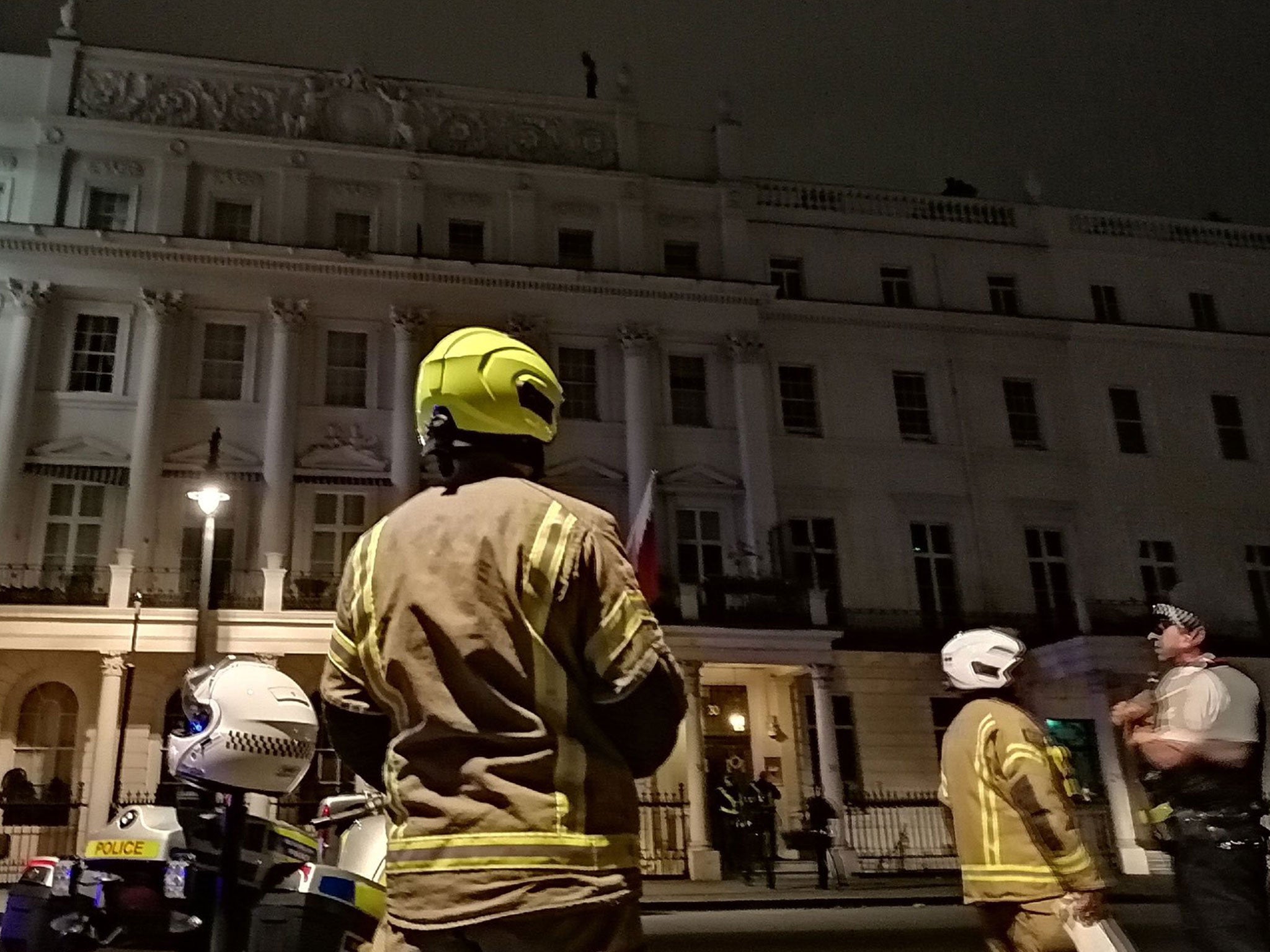Police storm Bahrain embassy in London after man scales roof to protest executions
Embassy staff accused of beating protester but Bahraini officials claim he was ‘restrained for his own safety’
Police have stormed the Bahrain embassy in London after a dissident climbed onto the roof to protest the imminent execution of two men.
Moosa Mohamed could be heard shouting “Boris Johnson wake up, prime minister, wake up” as supporters and passers-by gathered in the street below on Friday night.
He unfurled a banner reading: “I am risking my life to save two men about to be executed in the next few hours. Boris Johnson act now!”
Mr Mohamed vowed not to leave the roof until Mr Johnson contacted the King of Bahrain to stop the executions, which went ahead on Saturday morning.
A livestream of the protest, in London’s Belgrave Square, showed police facilitating the demonstration before panic broke out when a second figure was seen on the roof.
Officers used a megaphone to order embassy staff back inside the building as Mr Mohamed disappeared from view and was heard shouting.
“Please save him,” a supporter urged police. “He is screaming for help.”
As more Metropolitan Police units arrived on the scene and a helicopter flew overhead, officers tried the embassy door but found it locked.
Firefighters used a battering ram to break it open before police stormed the building.
Mr Mohamed was brought out of the building and checked by paramedics, before being arrested for trespass on a diplomatic premises.
Sayed Ahmed Alwadaei, director of campaign group the Bahrain Institute for Rights and Democracy, accused embassy staff of threatening and beating Mr Mohamed.
He added: “The UK government must halt all training to Bahrain’s brutal police and condemn the barbaric extrajudicial killings that took place early this morning.”
A spokesperson for the Bahrain embassy said Mr Mohamed had gone “far beyond any legitimate peaceful protest”.
“The individual was threatening to jump off the roof and embassy staff stepped in to restrain him for his own safety until the police had arrived,” a statement added.

“Diplomatic premises are protected under both international and United Kingdom law.”
A spokesperson for the Metropolitan Police said officers were called to the Bahrain embassy at 10.45pm on Friday to reports of a man on the roof.
“Officers and London Fire Brigade attended,” a spokesperson added. “Upon hearing a disturbance on the roof, officers entered the building and detained the man. Security staff were also present.
“The man was arrested for trespass on a diplomatic premises. He is currently in police custody.”
Embassy staff are subject to diplomatic immunity, but the Foreign Office has previously vowed to take any allegations of illegal activity seriously.
At a previous protest in the embassy in January 2017, staff were accused of throwing hot water from a balcony onto demonstrators sitting below.
Mr Mohamed was demonstrating against the execution of two men who had allegedly been subjected to torture in Bahraini custody.
Ali al-Arab, 25, and Ahmed al-Malali, 24, were executed on Saturday morning after being convicted in a Bahraini court of involvement in the murder of two police officers, a violent prison break, gun and explosive smuggling and attempting to “illegally exit” Bahrain.
A spokesperson for the Gulf state’s London embassy said the pair were linked to a Shia militant group called Saraya al-Ashtar, which is proscribed as a terrorist organisation by the UK and has claimed responsibility for attacks including the prison break.
They said Mr al-Arab and Mr al-Malali had appealed unsuccessfully to Bahrain’s Court of Appeal and Court of Cassation and “due process, representation and fair trial upheld throughout”.

“Forensic evidence presented in the case included fingerprints found on explosive devices, phone records and witness statements,” a statement added.
But United Nations experts and human rights organisations had called for a halt to the executions, following reports that the two men were tortured in detention, forced to sign confessions and denied a fair trial.
A letter to the Bahraini government from UN special rapporteurs and the Working Group on Arbitrary Detention said Mr al-Arab, a student, was held incommunicado and without access to a lawyer.
“During the interrogations, Mr al-Arab was allegedly subjected to several forms of torture: he endured electric shocks, the removal of toenails and severe beatings,” the document said. “He was later forced to sign a confession, while blindfolded, by an officer of the Public Prosecution Office.”
UN experts also documented allegations that Mr al-Malali had been shot twice while being arrested by the Bahraini coastguard, tortured “to coerce a confession” and prevented from meeting a lawyer.
In January 2018, both men were sentenced to death in a mass trial with 58 other defendants.
The legal charity Reprieve accused Bahrain of showing “callous disregard for international standards of due process”.
Deputy director Harriet McCulloch said: “The UK government has spent millions of pounds of public money in Bahrain, providing support to a criminal justice system that continues to torture and execute people following unjust trials.”
The island nation has been accused of human rights abuses against protesters and dissidents since a failed uprising that started during the 2011 Arab Spring.
Bahrain crushed protests, where the Shia Muslim majority were demanding greater rights from the Sunni-led monarchy, with the help of Saudi Arabia and the United Arab Emirates.
Bahraini authorities have detained critics, dissolved a major Shia opposition bloc and shut down an independent newspaper, forcing many Bahrainis into exile and stripping others of their nationality.
Lord Ahmad, the Minister of State for Human Rights, said: “The UK remains firmly opposed to the death penalty. We express deep concern and regret that these executions were carried out.
“The Bahraini authorities remain fully aware of the UK’s position. We will continue to engage with Bahrain on this issue bilaterally and at the UN Human Rights Council.”
Join our commenting forum
Join thought-provoking conversations, follow other Independent readers and see their replies
Comments
Bookmark popover
Removed from bookmarks